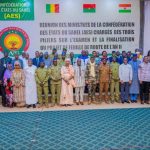
DE-NIGERIANIZATION The Imperative of Reconditioning. Raphael Adebayo, 2023.

Written By: Amara Ogwuma, Communications Expert, Health and Human Rights Advocate, and Development Professional
“De-nigerinization” is a compelling exploration of Nigeria’s history and the intricate challenges that have shaped the country. The author, Raphael Adebayo, builds the story by providing deep insights into the formation of Nigeria dating back to 1914 when the two protectorates (Northern and Southern) were merged to become a British Colony. This is a reminder that
Nigeria was only created to serve as a business for Great Britain. Adebayo presents a concise yet comprehensive analysis, emphasizing the urgent need for fundamental change to propel the country forward.
His narrative skilfully navigates through the historical landscape of Nigeria, exposing a foundation fraught with flaws that have given rise to deep-rooted issues, leading to divisions within the nation. The core argument revolves around the inevitability of Nigeria’s division unless there is a substantial overhaul of the existing systems. Adebayo tells a story strikingly,
using key descriptions of the Nigerian society, regions, elites and people. Doing this, he delves into the pervasive issue of absolute corruption and impunity that has permeated every facet of Nigerian society, contending that thorough reconditioning is imperative for meaningful progress. The author asserts, “Light years have passed, and cultural impunity has become a
common denominator—from the highest stations of authority to the venal machines of state bureaucracies, otherwise called the civil service— in the Nigerian contraption, and it continues to sink deeper into society. Its currency as a detail of the Nigerian contraption is repulsively extensive. In wretched situations like this, only a radical reconditioning can make a difference”.

He is descriptive, carefully elaborating on the struggles of the different regions and the fight for secessions. Doing this, he manages to tie together the struggle for survival and regional recognition. A significant aspect of “De-nigerianization” addresses the Northern elite’s perception of leadership positions as their birthright, fostering an environment where the
South is relegated to a subordinate role. Adebayo aptly criticizes this imbalance, characterizing it as a clash between the less progressive core-North and the literate, forward-thinking middle-belt and Southern regions. He also addresses the complexities surrounding the Eastern region, the Indigenous People of Biafra (IPOB), and the Eastern Security Network (ESN), shedding light on the spiralling of a peaceful protest into a more contentious situation, perhaps exacerbated by government actions.
The author proposes two potential imminent outcomes for Nigeria’s future: absolute secessionism and relative secessionism. The former is speculated to involve agitations from self-determination groups like the Niger Delta Republic, Oduduwa Nation and Biafra, while the latter describes individuals disillusioned with the Nigerian system but ideologically hesitant about secession. Nigerians need to carefully consider the path they wish to undertake, as both alternatives pose formidable challenges. “Reconditioning is the realization that what we call Nigeria today cannot sustain itself; that it is foredoomed to crumble under the weight of its own contradictions.” Adebayo posits that “De-nigerinization” is a mental state, prompting the
recognition that the existing understanding of Nigeria must undergo a process of relearning. It serves as a call to consciousness for the ordinary Nigerian to discard prevailing norms and adopt values conducive to the nation’s progress.
The core strength of this book lies in the call for a renewed commitment to human rights, true nationality, and intentional development. He advocates for a fair distribution of power, emphasizing the need to decentralize authority and ensure equitable distribution of the nation’s wealth. Overall, “De-nigerinization” offers valuable insights and proposes actionable
solutions; however, its professional-level language may pose a challenge for readers not well-versed in the subject matter.

In conclusion, “Denigerinization” is a short read, yet a thought-provoking and incisive analysis that demands the reader’s attention; it provides a unique perspective on Nigeria’s challenges and potential pathways to advance. It serves as a compelling call for action, urging Nigeria to confront its historical flaws and embrace a progressive reconditioning for a better future.
About The Author
Related Articles
Opinion: Their Tribal Loyalties Are Stronger Than Their Sense of Common Nationhood
A REVIEW OF LEE KUAN YEW’S FROM THIRD WORLD TO FIRST Regarding...
ByGbọ́láhàn AdébíyìJuly 1, 2025Heaviest is the Crown that History Wears
REVIEW OF OBARO IKIME’S CAN ANYTHING GOOD COME OUT OF HISTORY? Heaviest...
ByGbọ́láhàn AdébíyìFebruary 28, 2025Abandon All hope, Ye Who Enter Here (A Review of David Hundeyin’s Breaking Point)
“𝘭𝘢𝘴𝘤𝘪𝘢𝘵𝘦 𝘰𝘨𝘯𝘪 𝘴𝘱𝘦𝘳𝘢𝘯𝘻𝘢, 𝘷𝘰𝘪 𝘤𝘩’𝘦𝘯𝘵𝘳𝘢𝘵𝘦.” The above line from Dante’s 𝘐𝘯𝘧𝘦𝘳𝘯𝘰 kept...
ByHymar IdibieOctober 3, 2024Must-Read Non-Fiction African Books for the First Half of 2024 – WAW Edition
The first half of 2024 has seen the release of a remarkable...
ByIkenna ChurchillJuly 25, 2024












Leave a comment